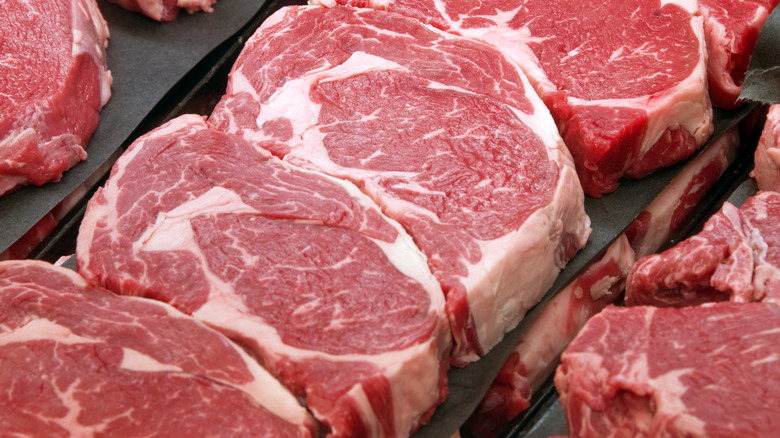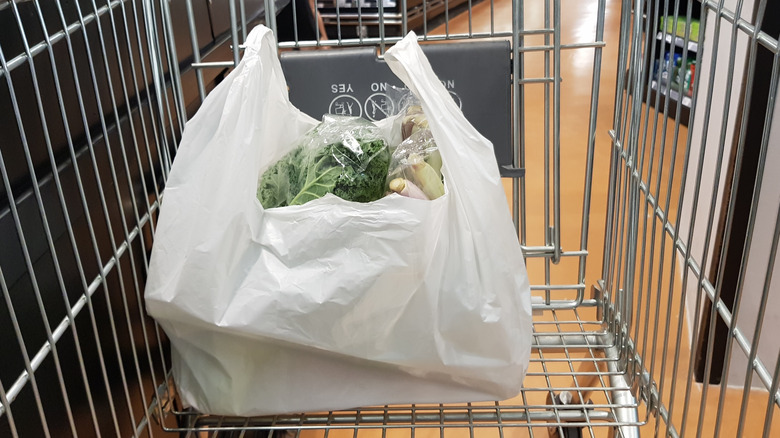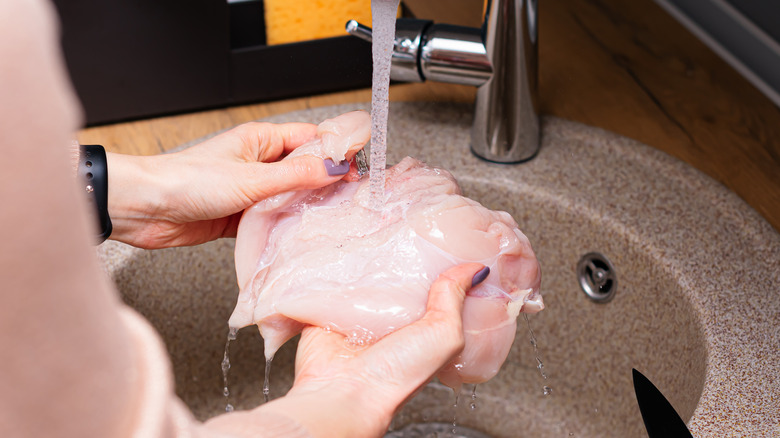Be Safe And Double-Bag Your Meat At The Grocery Store
Americans love our meat perhaps more than we should, as our overconsumption can lead to some meats being increasingly difficult to find. But, look, we can't quit meat as Americans, even if we know we should; not being able to have a hamburger or a steak whenever we want just feels distinctly, well ... un-American. But while meat may be delicious, it can come with serious health concerns if you're not handling it properly. There are some meat safety tips that you really should be aware of, if you're not already.
And one of the key ones starts before you even leave the store. It's more important than you might realize to make sure to double-bag your meat products, especially if they're fresh rather than frozen. Why should you do this? So everything doesn't get covered in meat juice and create a bacterial nightmare that ruins your entire grocery run.
Make sure you double-bag your groceries if you don't want food poisoning
The proper bagging procedure for meat isn't as simple as just putting one bag inside another. What you want to do is put the package inside a plastic bag (separate from other items, especially produce), and then take a second plastic bag and pull it across the first one from the opposite direction. This ensures that the bag is covered from both angles, so if there's a leak, it's less likely to get anywhere other than the inside of the bag. Then, when you get the meat home (which should be as quickly as possible), make sure to refrigerate it. If you're not going to cook it immediately (four to five days for whole meat and one to two days for ground meat), you should also freeze it to avoid spoilage.
Meat juice isn't just kind of a gross term in its own right, it can actually cause serious health concerns. There's a whole host of food poisoning-causing bacteria, like salmonella, E. coli, campylobacter, and yersinia, potentially present on the surface of raw meat, and those leaking juices are an absolute breeding ground for the stuff. This is why you also need to wash your hands thoroughly in between handling raw meat and doing anything else in the kitchen. It's perfectly safe if you follow proper procedures — but you have to make sure you're following them because a lot of people don't.
Another meat safety tip: Do not wash your chicken
This isn't the only thing to be aware of when dealing with meat safety and potential contamination. You might think that if bacteria is such a problem, you really should be washing your meat, especially chicken, where salmonella is clearly a huge concern. The answer to that is absolutely not. It may seem paradoxical, but washing raw chicken, depending on how you do it, can significantly increase contamination risk.
The reason is the surface of poultry tends to be a huge breeding ground for bacteria, like campylobacter and salmonella, and if you're washing it, all you're doing is spraying that bacteria all over your kitchen. The same meat juice that's such a risk if you don't bag it right is an even bigger problem here. You can get around this if you're very careful to sanitize the entire room, but why would you do that when washing the chicken confers no health benefit? Water doesn't get rid of bacteria, and nor do lemon and vinegar; what solves that problem is simply cooking the chicken properly.
If you don't like the juice on the exterior and don't think it cooks away enough, pat your chicken dry with paper towels; it'll get rid of that excess juice without potentially creating a campylobacter fire hose. Preparing your meat safely is as important as, if not more so than, preparing it in a way that tastes good, so please, follow proper procedures.


